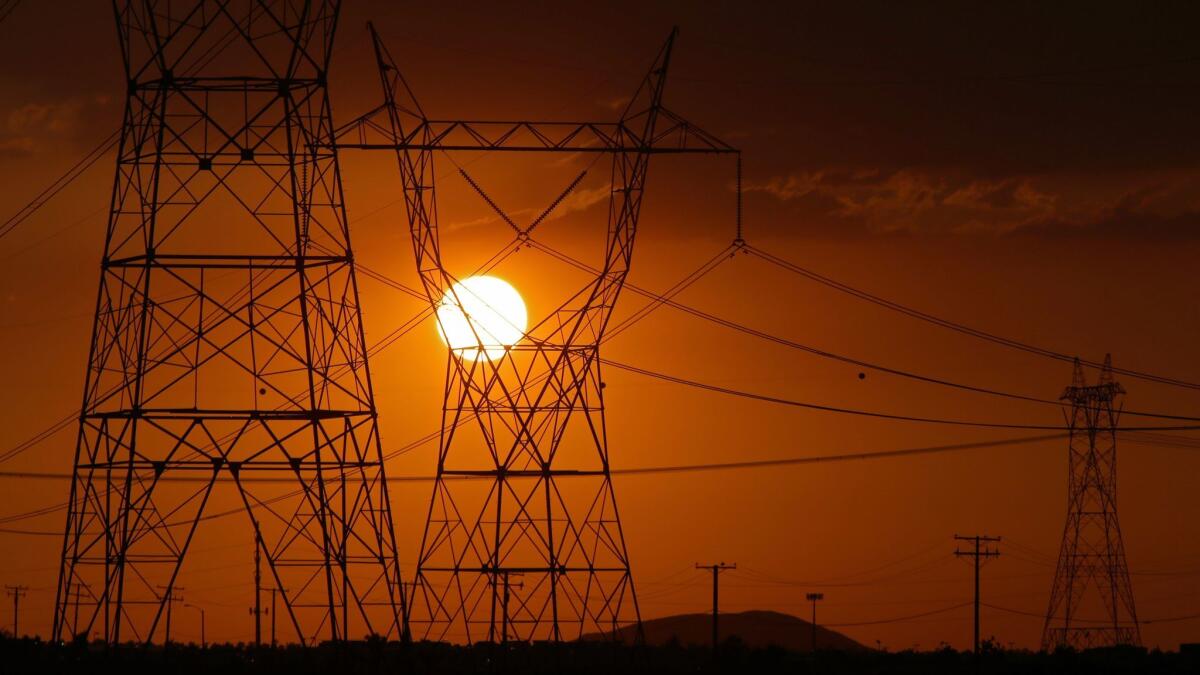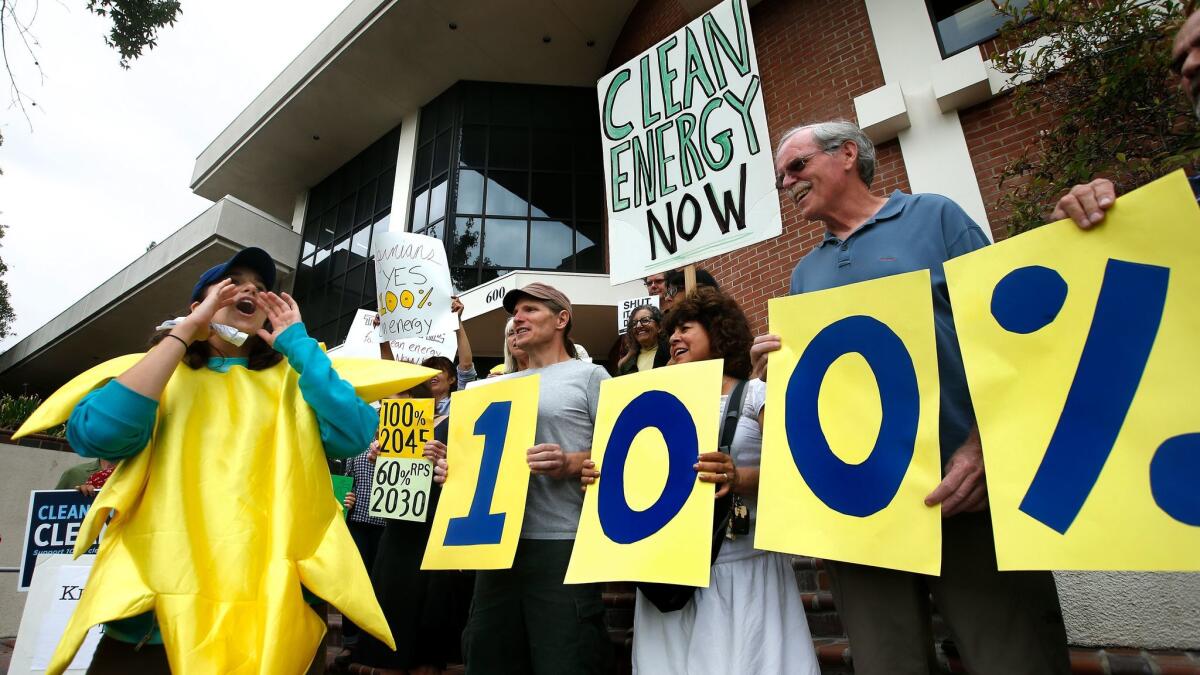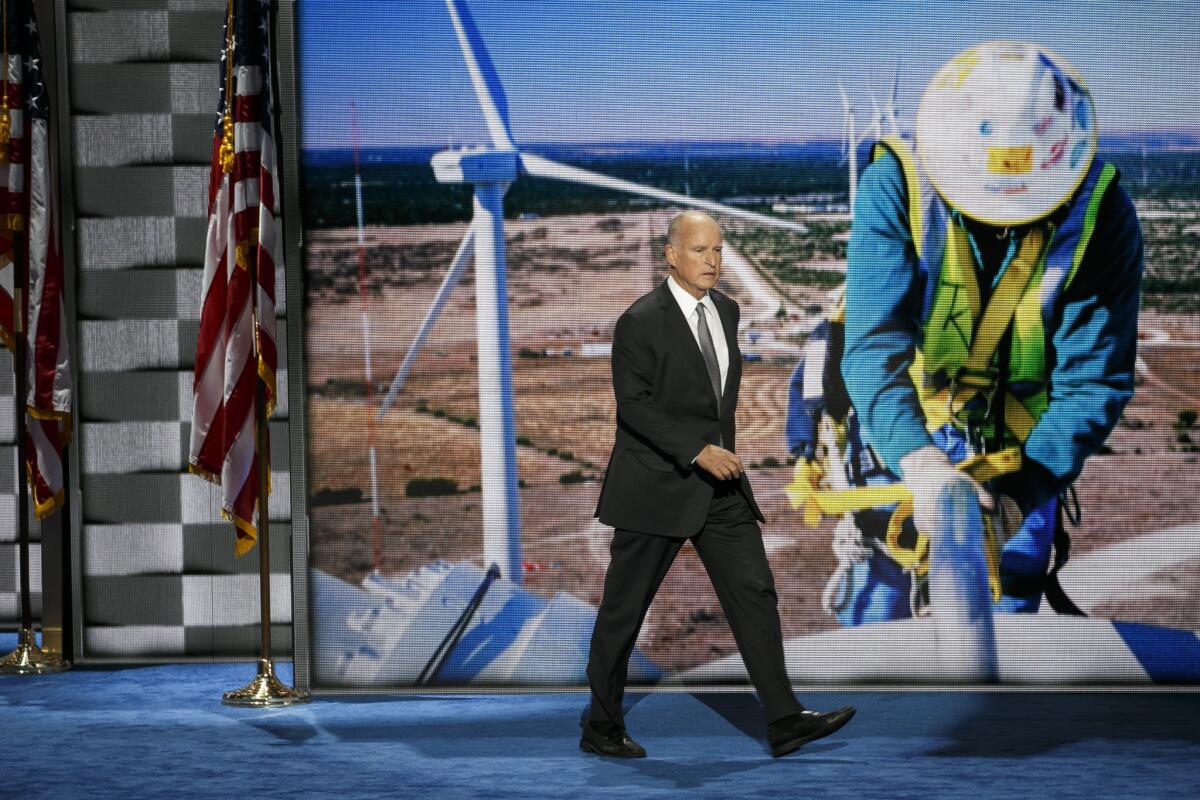California clean energy proposals face demise as opposition fails to yield

- Share via
California has grown accustomed to setting benchmark after benchmark on environmental policies, but ambitious efforts to spread renewable energy around the state and the region could grind to a halt this week.
One proposal, Senate Bill 100 from state Senate President Pro Tem Kevin de León (D-Los Angeles), would phase out fossil fuels for generating electricity within three decades. The others, Assembly Bills 726 and 813, would lay the groundwork for a regional electricity grid that could make it easier to share renewable energy among Western states, a goal of Gov. Jerry Brown.
For the record:
2:50 p.m. Sept. 14, 2017A previous version of this story included the wrong number for Assembly Bill 726.
But champions of the efforts have struggled to overcome disagreements among unions, utilities, environmentalists, energy companies and lawmakers in the final days of the legislative session. Attempts to broker compromises between competing interests have repeatedly fallen short, and divisions have grown increasingly bitter.
In one particularly fraught episode, unions representing electrical and utility workers accused De León of abandoning a promise to help protect their jobs, though the senator’s office denies that any pledge was made.
Some advocates have refused to give up hope on pushing for more clean energy, calling lawmakers’ offices, rounding up supportive tweets from celebrities including Bill Nye and Mark Ruffalo and holding a rally Thursday to crank up the pressure. But prospects for any deals grew dimmer Tuesday night, the deadline for making changes to any legislation scheduled for a vote before the session ends Friday evening. No amendments to the bills were filed.
On Wednesday, Assemblyman Chris Holden (D-Pasadena) told The Times that none of the proposals would advance this year. As chairman of the Assembly Utilities and Energy Committee, he’s a key gatekeeper for De León’s proposal, and he authored the legislation containing Brown’s grid plan.
“There’s not a lot of time for the engagement we need to make it work,” he said, adding that energy proposals should be considered as part of a “comprehensive conversation” next year.

The outcome would represent a setback for California’s efforts on climate change less than two months after lawmakers extended the state’s landmark cap-and-trade program, which requires companies to buy permits to release greenhouse gases into the atmosphere.
A spokesman for Brown, who pushed the regional electricity grid concept, declined to comment on Wednesday. The governor’s top aide, Nancy McFadden, previously suggested that work could continue next year.
Merging California’s grid with those in neighboring states has been a controversial idea, one that’s been discussed for years, but it wasn’t included in legislation until Friday evening. The proposal would have launched talks with regulators and utilities in the region to create a new governance structure in which oversight of the electricity grid is shared among multiple states.
If successful, California would need to cede some control over its grid, which is currently managed by a board appointed by the governor and confirmed by state senators.
Supporters have described the idea as an essential tool for making clean energy more available around the region. California could more easily export solar power and import hydroelectric or wind power from other states.

Utilities opposed the legislation because it also included a provision requiring them to expedite their purchase of renewable energy resources to take advantage of federal tax credits that are slated to begin expiring next year.
The acceleration was intended to ensure that more solar and wind plants are built inside California, preserving jobs for union members who believe regional cooperation means jobs would leave the state.
The impasse was just one example of the struggle to reach an agreement this year.
“This may be one of the most complicated pieces of legislation we’ve worked on,” said Jan Smutny-Jones, chief executive of the Independent Energy Producers Assn.
Even supporters of the regional concept have signaled that they’re comfortable waiting until next year to reach a deal.
“It’s the end of session, and emotions are running high,” said Donald Furman, who leads Fix the Grid, a campaign seeking more regional cooperation. “While regionalization has been broadly discussed for some time, the last two weeks have been the first time that it has been seriously taken up.”
Meanwhile, De León has pledged to continue pushing SB 100, his clean-energy legislation. The measure would require the state to obtain 60% of its electricity from renewable sources such as solar and wind by 2030, and it would direct regulators to ensure no electricity comes from fossil fuels by 2045.
“We’re still hopeful,” he said. “The people want 100% clean energy.”
Environmentalist activists quickly ramped up the pressure on Holden, who said the measure didn’t have enough support in the Assembly, and urged supporters to call his office to demand a hearing.
“This is a perfect case of putting the future of Californians at risk,” said Kathryn Phillips of the Sierra Club.
The proposal was introduced in May and appeared to have a clear path for months, despite resistance from utilities. However, unions representing utility and electrical workers announced their opposition last week, accusing De León of failing to include provisions to protect their jobs. De León’s office denied the accusation.
“We would be better off starting again in January,” said Tom Dalzell, business manager for the International Brotherhood of Electrical Workers Local 1245.
Times staff writers Liam Dillon and Melanie Mason contributed to this report.
Twitter: @chrismegerian
ALSO
Lawmakers move to add other states to oversight of California’s electric grid
Key lawmaker says California energy legislation will hold until next year
Proposal for 100% clean energy faces new political challenges as it nears the finish line
Updates on California politics
UPDATES:
6:05 p.m.: This article was updated with additional details about celebrity supporters and a Thursday protest.
This article was originally posted at 12:05 a.m.
More to Read
Get the L.A. Times Politics newsletter
Deeply reported insights into legislation, politics and policy from Sacramento, Washington and beyond. In your inbox twice per week.
You may occasionally receive promotional content from the Los Angeles Times.











